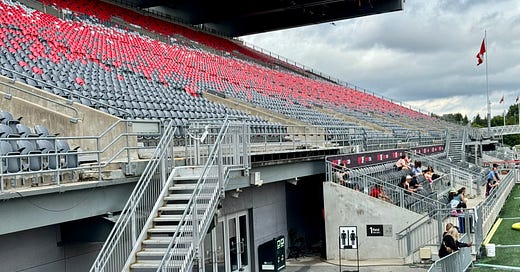Fix Governance 3: Let the People Decide If It's Big and Controversial
Join the call for the City of Ottawa to hold a referendum before spending $493 million on a Lansdowne stadium renovation.
We believe the City of Ottawa, in light of the municipality’s financial crisis, should hold a referendum on spending $493 million to renovate the Lansdowne Park sports stadium and arena.
If you agree, add your name to the petition calling on the City of Ottawa to hold a referendum on Lansdowne:
When Should a City Consider a Referendum?
Holding a referendum is a powerful tool in a democratic society, but it's not something that should be used lightly.
Some cities have never held a referendum. But that should not be a reason to not consider doing one in the future.
Cities should consider holding a referendum when some of the following conditions apply:
1. Big ticket items
Investments running to the hundreds of millions, or billions, of dollars is a long-term financial commitment that taxpayers will be funding for decades.
Putting this decision to a referendum ensures that these long-term commitments have broad public support, rather than just the approval of elected officials whose terms may end well before the consequences are fully realized.
2. Controversial
When a proposed project is considered controversial and without broad public appeal, referenda should be considered. Funding sports stadiums is the clearest example of this.
Economist Robert Reich, in this 4 minute video, describes how stadiums are seen as a gift to billionaire sports team owners, who use the threat of relocating the team if public dollars are not invested in a new or upgraded facility.
Many American cities have held referenda on whether to pay for new sports stadiums for major league teams. University of Colorado Denver professor Geoffrey Propheter has a database on stadium referenda. He reports that since 1987, 65 US cities have held referenda on new stadiums, of which 36 were approved and 29 rejected.
Calgary, Montreal West, Victoria and Langford, B.C. have all held, or are currently holding, referenda on funding sporting facilities.
3. Social or environmental impact
Decisions that could drastically alter the social or environmental landscape of a city should be considered for a referendum. This might include large-scale urban redevelopment projects that could displace communities or destroy significant green spaces for new developments.
When a decision has the potential to reshape the fabric of a community, the people living in that community should have the opportunity to decide.
Two out of three
Ideally, a decision being put to a referendum would meet two or more of these conditions.
Price tag alone is probably not a sufficient rationale for holding a referendum. It’s easy enough to find a critical mass of people who will oppose any tax increase regardless of what new investment or service it may offer.
Direct democracy is not perfect. But it has its time and place.
Time for a Lansdowne referendum
For the City of Ottawa, we believe that time has come. Sign the petition at the link below calling on the City to holding a binding citywide referendum before spending $493 million on Lansdowne.







Of course, as with all referenda, the wording of the question is critical, as is the education of residents to the issues and trade-offs at stake in the decision. How to make sure the question is fairly articulated… who gets to write it?
Other jurisdictions (California being the prime example) have been employing ballot propositions (referendums) for decades. How can we think of our own forms of municipal, provincial, and federal governance as being democratic if we do not employ referendums on big-ticket or culturally significant issues. You can bet that Montrealers wish they could go back in time to vote against their Big Owe stadium.